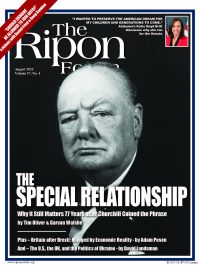
At his meeting on July 10th in London with UK Prime Minister Rishi Sunak, President Biden described the relationship between the two countries as “rock solid.” But is it “special” and does it matter?
For the British political establishment, and to a large extent for the British public, this question has defined the relationship at least since the Second World War, as a key measure of the country’s place in the world. Despite its ups and downs, from Suez to the epoch-defining Reagan-Thatcher partnership and more recently, its durability, based on democratic values and shared security interests, has rarely been disputed.
The security relationship was built at the end of the Second World War and saw both countries through the Cold War, a period of bipolar geopolitics with its principal theatre in Europe. How does it stand up in today’s bipolar-to-multipolar world, where the focus of attention for the U.S., is increasingly the Pacific?
Taking a snapshot today, far more unites the two countries than divides them. Ukraine has reaffirmed the salience of the relationship. Much can be understood from two key politico-military ratios. The U.S. and UK are the two largest providers of military assistance to Ukraine. But the gap between the U.S. commitment (around $38 billion) and the UK’s ($5.9 billion) is also highly significant.
The U.S. and UK are the two largest providers of military assistance to Ukraine. But the gap between the U.S. commitment (around $38 billion) and the UK’s ($5.9 billion) is also highly significant.
The UK’s starting point is security in Europe and even closer to home – the country remains stung by the Russian Novichok attack in Salisbury, England in 2018 – while for the U.S. its position on Ukraine crucially reflects the need to deter Chinese aggression against Taiwan. The UK has of course also made an important commitment to Indo-Pacific security through the Australia, UK, U.S. (AUKUS) Agreement.
Despite this close alignment, there is a marked difference in both elite and public opinion between the two allies. While in the U.S. a lively debate is underway as to how far it is in American interests to go in support of Ukraine, in the UK it is barely possible to hear a politician or media voice (with the exception of far-left former Labor Party leader Jeremy Corbyn) challenging the commitment.
This unity of elite opinion is substantially reflected in the findings of the British Foreign Policy Group’s recent survey. According to the poll, a majority of Britons support all forms of aid provided to Ukraine and believe that the UK should support Ukraine for ‘as long as it takes,’ even including providing military aid to Ukraine such as missiles, armored vehicles and ammunition (69%). A majority, though markedly smaller, favors providing Ukraine with F-16 fighter jets.
Where next for the relationship? Recent disagreements – on F-16s (UK in favor, U.S. reluctant) and cluster bombs (U.S. in favor, UK a signatory to the international convention and therefore against) reflect a wider post-Cold War divergence (especially since the late 1990s Labor government), with the UK increasingly prepared to put the establishment of international norms above its own freedom of movement. (Some U.S. commentators might argue that the U.S. still shoulders the lion’s share of the commitment and cannot afford the same luxuries.)
Our survey found that the majority of Britons (53%) believe the UK should support Ukraine for as long as it takes, while a third (33%) of Britons believe the UK should encourage Ukraine to reach a peace deal.
These differences are largely baked in. More important is the scope for divergence if – as seems likely – the conflict drags on without a definitive Ukrainian victory and, potentially, with a new Administration in Washington less committed to “whatever it takes.”
In this scenario, a negotiated settlement, with whatever guarantees for Ukraine, if advocated by the U.S. and doubtless welcomed in much of Europe, would find a substantial part of British public opinion – which has not been prepared for anything other than a “triumph of good over evil” in a distressed position. Our survey found that the majority of Britons (53%) believe the UK should support Ukraine for as long as it takes, while a third (33%) of Britons believe the UK should encourage Ukraine to reach a peace deal. However, just 6% of Britons believe the UK should immediately withdraw from Ukraine. A further 9% of Britons are unsure of their view. It isn’t difficult to imagine that this slender majority could be eroded over time.
Whatever the outcome, how should the U.S. and UK work to bring the war to an end on acceptable terms? Military support is clearly essential, but so is diplomacy, abroad – and also at home. Maintaining Western unity and limiting visible differences beyond Vilnius is necessary but not sufficient. Sometimes a widely supported compromise may be better than contested “stretch goals.” Secondly, outreach needs to go beyond the West: the UK’s support for Ukrainian diplomatic engagement with the Global South has been valuable; resistance to the violation of a country’s territorial integrity is likely to resonate beyond Europe far more than a “war for Western values.” And finally, maybe most importantly, both countries would do well to keep reflecting on the nuances of domestic public opinion as the conflict evolves, in order to explain why, beyond easy slogans and graphic media images, the conflict really matters to Western interests.
David Landsman is Chair of British Expertise International and a Senior Adviser at BFPG and at its sister organization The D Group. He is a former British diplomat and senior executive whose main area of interest now is the interface between business, government and geopolitics. His diplomatic career included serving as British Ambassador to Albania and Greece and working on defense and proliferation.




